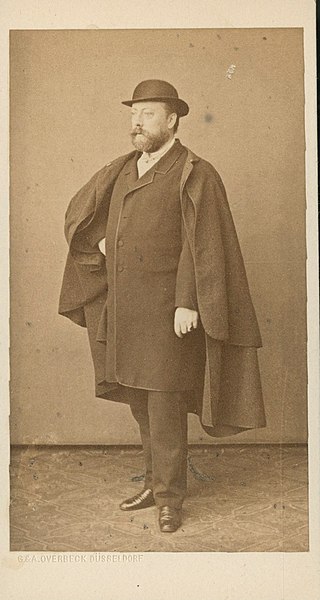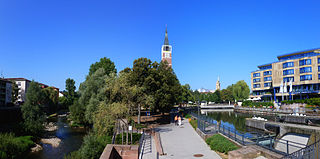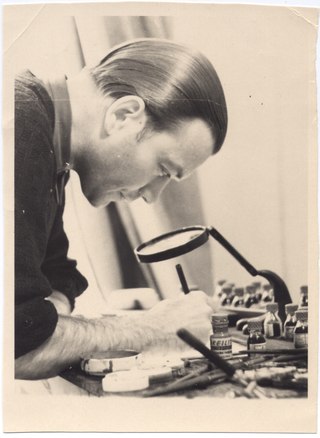This article needs additional citations for verification .(May 2024) |
Karl Abt (18 December 1899, Pforzheim - 28 November 1985, Pforzheim) was a German painter. [1]
This article needs additional citations for verification .(May 2024) |
Karl Abt (18 December 1899, Pforzheim - 28 November 1985, Pforzheim) was a German painter. [1]
Abt began to paint at the age of 12 and, with the support of his parents, enrolled in the Pforzheim Kunstgewerbeschule. In 1917, Abt was called into military service, effectively ending his studies. After the end of World War I, he was apprenticed to a goldsmith. It was not until 1928 that he again began to study painting, at the Landeskunstschule in Karlsruhe. In 1935, he returned to Pforzheim and began working as a self-employed artist. He gained recognition primarily for his naturalistic landscapes and flower paintings.

Egon Leo Adolf Ludwig Schiele was an Austrian Expressionist painter. His work is noted for its intensity and its raw sexuality, and for the many self-portraits the artist produced, including nude self-portraits. The twisted body shapes and the expressive line that characterize Schiele's paintings and drawings mark the artist as an early exponent of Expressionism. Gustav Klimt, a figurative painter of the early 20th century, was a mentor to Schiele.

Andreas Achenbach was a German landscape and seascape painter in the Romantic style. He is considered to be one of the founders of the Düsseldorf School. His brother, Oswald, was also a well known landscape painter. Together, based on their initials, they were known as the "Alpha and Omega" of landscape painters.

Pforzheim is a city of over 125,000 inhabitants in the federal state of Baden-Württemberg, in the southwest of Germany.
Rudolf Schlichter was a German painter, engraver and writer. He was one of the most important representatives of the critical-realistic style of verism within the New Objectivity movement. He also wrote some autobiographical books.

Karl Christian Ludwig Hofer or Carl Hofer was a German expressionist painter. He was director of the Berlin Academy of Fine Arts.

Wilhelm Trübner was a German realist painter of the circle of Wilhelm Leibl.

Karl Ferdinand Sohn was a German painter of the Düsseldorf school of painting.

Karl Friedrich Lessing was a German historical and landscape painter, grandnephew of Gotthold Ephraim Lessing and one of the main exponents of the Düsseldorf school of painting.
Otto Hans Abt was a Swiss painter.
Erwin Aichele was a German painter and animal artist from Baden-Württemberg in Southern Germany.

Otto Müller was a German painter and graphic designer.

Carl Friedrich Echtermeier, also known as Carl Echtermeier or Karl Echtermeyer, was a German sculptor.

Carl Wilhelm Götzloff was a German painter.

Karl Friedrich Rudolf Sohn was a German portrait painter in the Academic style.

Gunther Krichbaum is a German lawyer and politician of the Christian Democratic Union of Germany (CDU) who has been a member of the German Bundestag since the 2002 elections.

Hainer Hill was a German scenic designer, costume designer, painter, graphic artist and theatre photographer who was based in Berlin and worked internationally. After studying painting in Frankfurt, he worked at the Oper Frankfurt, assisting Caspar Neher. Together they moved to Brecht's Berliner Ensemble where Hill created an iconic stage for Mutter Courage and took hundreds of scene photographs now archived at the Akademie der Künste. When the Berlin Wall was erected, Hill, who lived in the West and had worked in the East, began to work freelance, including at the Royal Opera House. In 1966 he became director of scenery (Ausstattunggsleiter) at Opernhaus Dortmund, and there he created the stage for the world premiere of Eli by Walter Steffens, which was followed by 45 other productions. Hill is best remembered for his focus on light projection.

Karl Ludwig Kaaz, or Katz was a German painter, known primarily for his landscapes.

Carl Kuntz was a German landscape painter and etcher. Many of his works also feature animals.
Fred Kocks in Düsseldorf was a German landscape and figure painter, draughtsman and lithographer as well as curator, museum director and author.

Barbara of Württemberg was margravine of the historical German territory of Baden-Durlach. The daughter of Frederick I, Duke of Württemberg and his wife, Sibylla of Anhalt, she was born a Duchess of Württemberg and became margravine after marrying Frederick V, Margrave of Baden-Durlach, in 1616. She is depicted as Saint Barbara in a posthumous miniature portrait.